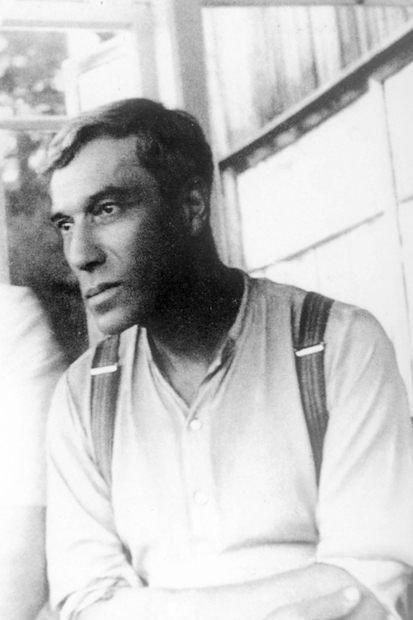For most Russians, Boris Pasternak is one of their four greatest poets of the last century. For most Anglophone readers, he is the man who won the Nobel Prize for Doctor Zhivago.
The first four chapters of The Zhivago Affair give a full picture of Pasternak’s life and the Soviet literary world up until the early 1950s, when Zhivago was nearing completion. Pasternak was born in Moscow in 1890, into an assimilated and highly cultured Jewish family. His father was a painter, his mother a concert pianist; among the family’s friends were Leo Tolstoy, Sergey Rachmaninov and Rainer Maria Rilke. Pasternak wanted first to be a composer, then a philosopher — but by the age of 22 he understood that his vocation was poetry.
In 1917 Pasternak wrote the poems that went into his most famous collection, My Sister Life. The main themes are love, revolution and creativity; the rhythms are impetuous, the imagery dazzling, the thoughts often incoherent. Unlike many of his friends and family, Pasternak chose not to emigrate after the October Revolution. Though soon shocked by the regime’s violence, he saw Russia as his only possible home. From the mid-1920s he began trying to write more simply — a process that culminated in Doctor Zhivago.
It is natural to wonder how Pasternak survived the Stalin era. This may have been in part because he somehow, perhaps guided by some unconscious instinct for self-preservation, established what one could call a ‘personal’ relationship with Stalin. This began after the suicide of Stalin’s wife in 1932. Thirty-three other writers published a collective letter in the Literary Gazette; Pasternak managed to append a separate message of his own.
Like nearly all Soviet writers, Pasternak joined in some of the public denunciations of the politicians sentenced to death during the show trials of the mid-1930s. He refused, however, to sign a letter calling for the execution of Marshal Tukhachevsky and other senior generals. Ignoring Pasternak’s clear refusal, the authorities included his signature in the published text of the letter. Pasternak then wrote to Stalin, saying he could not act as a judge of life and death. He also wrote letters to Stalin about Maya-kovsky, and about the Georgian poets he was translating. The unexpected tone of these letters, their odd fusion of reverence and intimacy, could well have made an impression on a tyrant concerned about his place in history. Whether Stalin truly said ‘We won’t touch this cloud-dweller!’ is uncertain, but there is no doubt that he kept at least one of Pasternak’s letters in his personal archive.
The main part of this book is a history, based on original research, of Pasternak’s last years and the publication of Doctor Zhivago. This will prove a valuable resource for scholars, though few more general readers will want to know the story in such detail. Rejected by Soviet publishers, the novel was smuggled to Milan in 1956. Pretending that Pasternak had withdrawn his consent, the Soviet authorities did their best to prevent publication of the Italian, English and other translations; Peter Finn and Petra Couvée catalogue every letter, telegram and meeting.
In 1958 Pasternak was awarded the Nobel Prize, but, under pressure from the Soviet authorities, he eventually wrote to the Nobel committee to ‘renounce this undeserved distinction’. All this, of course, generated great publicity, and the English translation of Zhivago headed the New York Times bestseller list for six months. Pasternak’s reasons for refusing the prize remain unclear. Most likely, they were a complex mixture of emotional exhaustion, fear for those close to him, fear of exile, perhaps even a characteristic inability to decide — should he go into exile — whether this would be with his family or with his mistress, Olga Ivinskaya.
In 1960 Pasternak died of lung cancer. His funeral turned into a spontaneous public demonstration. One member of the public recited Pasternak’s poem ‘Hamlet’, in which Pasternak conflates the figures of Hamlet, Christ and his own self; this poem had yet to be published. Someone else said, ‘Sleep peacefully, dear Boris Leonidovich! We do not know all your works, but we swear to you at this hour: the day will come when we shall know them all.’
The Zhivago affair was the second clear indication, after the Soviet invasion of Hungary in 1956, that Khrushchev’s ‘thaw’ was not going to change the Soviet Union fundamentally. The ramifications of the affair were enormous. Finn and Couvée explore some of the more positive ones. The CIA helped to fund and organise a Russian-language edition of the novel to be smuggled into the Soviet Union. For the next 30 years the CIA would continue its admirable programme of supporting the foreign publication of Russian texts of censored writers and also of such western writers as Koestler and Orwell. It was easy for foreign students and other visitors to obtain copies of these and take them into the Soviet Union; at worst, the books might get confiscated by Soviet customs. Between 1958 and 1991 around ten million copies of books and periodicals were distributed in Eastern Europe and the Soviet Union.
Finn and Couvée say less about the affair’s negative consequences. The most serious was that the Soviet authorities learned from their mistakes. Three years later, when Vasily Grossman (1905–1964) was trying to publish Life and Fate, their response was carefully judged. Instead of leaving the manuscript at large and harassing its author, they left the author in peace and confiscated his manuscript. As a result, the first Russian text of Life and Fate was published only in 1980. And even when Grossman’s shorter but perhaps greater novel Everything Flows was published in the West in the 1970s, in Russian and in translation, it attracted little attention.
Western scholars and critics were, in general, slow to notice Soviet writers whose lives were not marked by international controversy. Andrey Platonov (1899–1951), for example, is seen by many Russian writers and critics as the finest Russian prose-writer of the last century, but he is still little read outside Russia. Finn and Couvée, for their part, refer to Vasily Grossman merely as ‘a journalist’. Still worse, they describe Varlam Shalamov (1907–1982) — a writer of the stature of Primo Levi — merely as ‘a Gulag survivor and one of Pasternak’s most ardent admirers’. The propaganda battles of the Cold War inevitably engendered misapprehensions; it is a pity that Finn and Couvée have not done more to correct them.






Comments